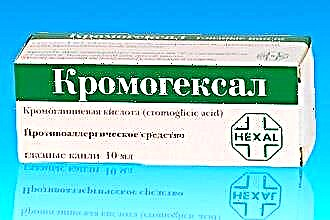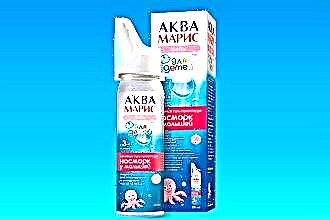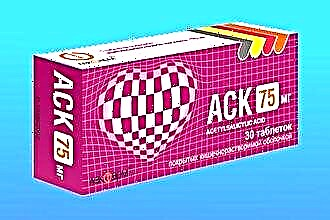The reason for the development of an allergic rhinitis is an inadequate reaction of the body to the effects of certain irritating substances - polluted air, medicines, food, animal hair, etc. The ingress of allergens into the nasopharynx entails an immediate reaction - inflammation, hypersecretion of nasal mucus, sneezing, swelling of the nasal passages and conjunctiva of the eyes. Can allergic rhinitis be cured at home?
 The disease of mild severity can be cured independently, observing the rules for conducting desensitizing therapy. First, it is necessary to exclude contact with substances to which there is an increased sensitivity, i.e. sensitization. Secondly, it is advisable to adhere to a special diet, thanks to which it is possible to prevent the development of cross-allergic reactions. And thirdly, you need to take systemic and local antiallergic drugs in a timely manner.
The disease of mild severity can be cured independently, observing the rules for conducting desensitizing therapy. First, it is necessary to exclude contact with substances to which there is an increased sensitivity, i.e. sensitization. Secondly, it is advisable to adhere to a special diet, thanks to which it is possible to prevent the development of cross-allergic reactions. And thirdly, you need to take systemic and local antiallergic drugs in a timely manner.
Treatment methods
How to cure allergic rhinitis? First you need to determine the reason for its development, i.e. allergens. They may be:
- epidermal - wool and feathers of animals;
- fungal - mold and yeast-like fungus;
- food - milk, honey, peanuts, butter;
- pollen - flower pollen;
- household - washing powder, colognes, household chemicals, etc.
To reduce the severity of allergic reactions, it is recommended to strictly monitor the cleanliness of the house. During an exacerbation of the disease, contact should be excluded for some time not only with allergens, but also with those substances that can potentially irritate the nasopharyngeal mucosa. It is advisable to do wet cleaning in the house at least 2 times a day - wipe the horizontal surfaces from dust, wash the floors, spray dry leaves of indoor plants, etc.
Even if the allergy was not provoked by plants, it is recommended to limit contact with indoor flowers for 10-14 days.
Allergists advise to remove from the field of vision "things-dust collectors", which include soft toys, carpets, microfiber and fleece covers, for 2-3 weeks. To reduce the swelling of the mucous membrane, you need to maintain a special microclimate in the room. It is advisable to use humidifiers, as well as regularly ventilate the room.
With food allergies, you just need to make some adjustments to your diet. You should temporarily exclude foods with a high degree of allergenicity from the menu - citrus fruits, honey, baked goods, nightshades, berries, etc. To track the dynamics of allergy regression, you need to keep something like a diary. In it, you need to record the hours of taking antiallergic drugs and the time intervals after which there is a clear relief of the symptoms of the disease.
Drug therapy
Allergic rhinitis negatively affects the patient's well-being and quality of life. Difficulty nasal breathing, swelling of the nasopharynx and conjunctiva of the eyes cause constant irritation, apathy and psychoemotional exhaustion. It is necessary to stop the manifestations of allergies in the bud, since rhinitis of moderate and severe forms is rather difficult to treat with medication.
Antiallergic drugs that are used in the treatment of allergic rhinitis are conventionally divided into two types:
- systemic - drops, pills, capsules and tablets for oral administration;
- local - nasal sprays and drops for irrigation of the nasal mucosa.
Depending on the principle of action, drugs are divided into:
- anti-inflammatory;
- immunostimulating;
- vasoconstrictor;
- antiallergic.
The duration of treatment depends on the chemical composition of the drugs used, the severity of the symptoms of the disease and, accordingly, the dynamics of recovery. Some patients are embarrassed by the presence of hormonal agents in treatment regimens, but it is this category of drugs that has the most pronounced anti-inflammatory effect on nasopharyngeal tissue. In addition, modern drugs are practically devoid of disadvantages: they do not irritate the mucous membrane and do not cause significant adverse reactions.
Intranasal corticosteroids
Modern hormonal drugs are among the safest anti-inflammatory drugs. Their active substances are practically not absorbed into the bloodstream, therefore they do not cause side reactions and do not reduce local immunity. Intranasal corticosteroids inhibit nasal mucus hypersecretion and mucosal inflammation. In addition, they reduce the sensitivity of histamine receptors, thereby reducing the likelihood of recurrence of ENT disease.
The only drawback of hormonal drugs is that they act rather slowly. For this reason, it is recommended to use them together with antihistamines. To stop inflammation and swelling of the nasopharynx, you can use the following corticosteroids:
- "Sintaris";
- Nazarel;
- "Alsedin";
- Fluticonazole;
- "Nasobek";
- Fliksonase.
Intranasal corticosteroids are first-line drugs that must be used during the treatment of allergic rhinitis.
The process of treating preschool babies and women during gestation should be monitored by an allergist. An overdose of drugs sometimes leads to undesirable side reactions - diarrhea, hives, dizziness and poor appetite.

Antihistamines
The action of antiallergic drugs is based on inhibition of inflammation by preventing the synthesis of so-called inflammatory mediators. Antihistamines interfere with the production of histamine and serotonin, which contribute to the dilation of blood vessels and, consequently, mucosal edema. Taking medications allows you to eliminate most of the local manifestations of rhinitis - itching in the nose, congestion, hypersecretion of nasal mucus, etc.
The most effective in the treatment of allergic rhinitis are antihistamines of the 2nd and 3rd generation. They do not cause adverse reactions in the form of nosebleeds and irritation of the nasopharyngeal mucosa. Antiallergic medicines are available in various pharmacological forms: ointments, sprays, nasal drops, tablets, syrups, etc. As a rule, home treatment of allergic rhinitis is carried out using drugs such as:
- Claritin;
- "Zirtek";
- Erius;
- "Allergodil";
- Tizin Allergy;
- "Histimet".
In the process of choosing antihistamines, it is necessary to take into account the presence of a sedative effect. It is advisable to use medications with sedative effects only before bedtime, as they cause drowsiness. Such drugs as "Tavegil" and "Diprazin" are recommended for the treatment of lingering allergic rhinitis.
Nasal antihistamines are the most effective medications for relieving nasal congestion, swelling and inflammation of the conjunctiva of the eyes.
Cromoglycates
Cromoglycates are membrane-stabilizing drugs that prevent the destruction of mast cell walls and the release of inflammatory mediators from them. As you know, during the initial contact with allergens in the body, specific immune cells are formed, which are called mast cells or mast cells.With the repeated penetration of antigens into the nasopharynx, their cellular structures are destroyed, as a result of which a large amount of histamine, serotonin, arachidonic acid, etc. enters the tissues. It is the release of inflammatory mediators that becomes the main cause of the manifestation of undesirable reactions in the mucous membranes.
As practice shows, taking cromoglycates prevents the triggering of allergic reactions and, accordingly, the development of rhinitis. The most effective and safe drugs in this group include:
- Iifiral;
- "Cromohexal";

- Hi-Krom;
- Lekrolin;
- "Kromosol".
Important! Cromoglycates stop the manifestations of rhinitis only at the initial stages of the development of allergic reactions.
Due to the fact that drugs based on cromoglycic acid stabilize cell membranes and prevent the release of inflammatory mediators, they are recommended to be used in the treatment of colds of viral etiology.
Vasoconstrictor drugs
Vasoconstrictor nasal sprays and drops will help to achieve quick relief of nasal breathing. Already 2-3 minutes after irrigation of the nasopharyngeal mucosa, the patency of the nasal canals increases and the patient's well-being improves. But doctors warn that these funds should not be abused. They are addictive, dry out mucous membranes and increase the risk of developing drug-induced rhinitis.
Important! Vasoconstrictor drugs can be used for no more than 4-5 days in a row.
Vasoconstrictor drops stimulate a decrease in the diameter of the vessels, as a result of which the production of nasal mucus is significantly reduced. They are recommended to be used only in emergency cases, as well as before carrying out sanitizing procedures. The most famous nasal drops and sprays include:
- "Nazol";
- Galazolin;
- Otrivin;
- "Naphtizin";
- "Suprima-Noz";
- "Fornos".
For the treatment of advanced allergic rhinitis, it is sometimes recommended to use systemic vasoconstrictors - "Rinopront" and "Coldakt". But they can only be used on the recommendation of a specialist and no more than 6 days in a row. It should be understood that only a qualified doctor can correctly draw up a therapy regimen. In order to quickly cope with allergic rhinitis, it is advisable to undergo complex treatment, which involves the simultaneous use of anti-allergic, wound-healing, immunostimulating and anti-inflammatory medications.




